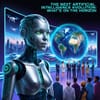The next artificial intelligence evolution is expected to bring about significant advancements in various industries, transforming the way we live and work. One of the key areas of development will be improved business automation, where AI will continue to automate routine tasks, freeing up employees to focus on strategic and creative pursuits. This could lead to increased productivity and efficiency across different settings.
Another area that will see significant advancements is human-AI collaboration. AI will become a powerful tool that enhances human capabilities, fostering seamless collaboration between humans and AI systems. This could revolutionize industries like healthcare, finance, and education, where AI will assist professionals in making better decisions and improving outcomes.
Artificial intelligence agents will also become more prevalent, helping people with tasks that go beyond reminders and quick answers. These agents will be able to learn and adapt, responding in natural language and understanding daily habits. This will make them an essential tool for individuals and businesses alike.
The development of brain-computer interfaces (BCIs) will also enable direct communication between the human brain and external devices, reshaping how we interact with the digital world. This technology has the potential to improve accessibility and unlock new levels of creativity and innovation.
The next generation of wireless technology, 6G, will enable faster data transfer rates, lower latency, and greater connectivity. Edge computing will become increasingly important, allowing for faster processing and analysis of data. This will be crucial for applications that require real-time processing, such as autonomous vehicles and smart cities.
Sustainable technology will also be a key area of focus, with AI playing a crucial role in building a more sustainable future. AI will help monitor climate change, optimize energy usage, and reduce waste. Companies will use AI to track carbon footprints and develop eco-friendly solutions.
The potential impact of these advancements will be significant. While AI may replace some jobs, it will also create new ones, such as machine learning specialists, information security analysts, and AI-augmented skilled/creative roles. AI will drive innovation, streamline processes, and reshape how we experience technology, leading to increased efficiency and productivity across various industries.
In the healthcare industry, AI will transform the way doctors detect diseases, provide treatment plans, and improve patient outcomes. AI-powered systems will enable doctors to make more accurate diagnoses, develop personalized treatment plans, and improve patient care.
Overall, the next artificial intelligence evolution will bring about significant advancements in various industries, transforming the way we live and work. As AI continues to evolve, it's essential to stay informed and adapt to its changing landscape.


